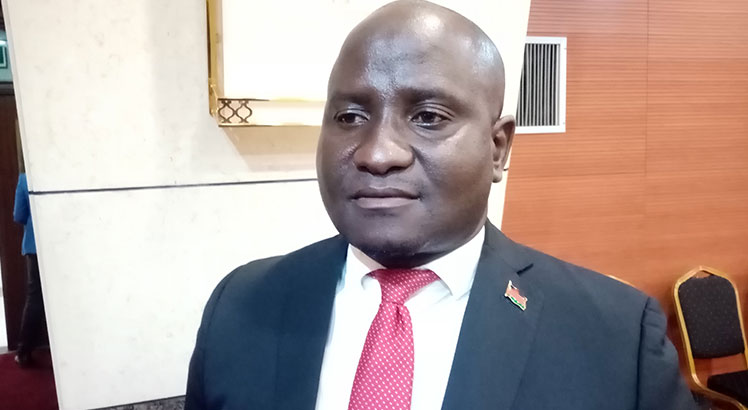In a desperate bid to achieve quality implementation, Ministry of Transport and Public Works has moved to tighten regulations to ensure that contractors delivering substandard work on public infrastructure face harsh punishment, including deregistration.
Minister of Transport and Public Works Jacob Hara announced the plans in Parliament yesterday during question time to ministers.
His sentiments followed a question from Lilongwe South East member of Parliament (MP) Baba Steven Malondera (Malawi Congress Party-MCP) on what government was doing to ensure construction of quality roads and other infrastructure in the country.
The legislator said: “From 1994 to present, a lot of roads which have been constructed have had to be maintained because of corruption and a lot of cutting corners in the way we are awarding contracts.
Chapananga Bridge in Chikwawa partially damaged by floods
“What is it that the Ministry [of Transport] is doing to ensure that Malawians are having value for their money by making sure that we are awarding contracts to the people who can do a good job for this and the next generation?”
In response, Hara said government is reviewing the National Construction Industry Council (NCIC) Act to include punitive measures.
He said: “We are now putting up regulations to bring debarring under the NCIC Act because in our laws we never had debarring which is to stop a contractor from further works because they have done shoddy work.
“Sooner or later, all the contractors that have given us shoddy work will actually be deregistered in our books. They will have to start all over again and prove that they are different.”
Hara, a civil engineer by training, further observed that some contractors deliberately tender with low cost in the hope that “when they get on the works, they will cut corners and in so doing it costs us much”.
The minister also faulted the country’s procurement laws for limiting the awarding of contracts to recruit expensive contractors.
“For example, if we want a 30-year design road, we are ready to pay for the cost, but our procurement laws again push us to a way where we have to use the cheapest [bid],” said Hara.
But procurement expert Amos Nyambo in an interview yesterday said the “lowest evaluated bidder” procurement law would not be a contributing factor to shoddy project implementation if public institutions thoroughly followed the bids evaluation process.
The former Malawi Institute of Procurement chairperson argued that other than pricing, the evaluation process also assesses the bidders’ other technical issues such as financial capacity and ability to execute the contract.
Nyambo said: “Every project has an engineer’s estimate which the procurement entity keeps. So, when bids come and then someone bids way below what the engineer has estimated, you should always raise questions and rule that one out.
“You can actually assess that this one is just trying to cut the price so that he gets the contract. That’s why you need to put more heads when you are doing the evaluation.”
In a separate interview, Indigenous Construction Contractors Association chairperson Alex Chimwala said it was wrong for government to target contractors when there are many entities involved in a project.
He said: “They need to look at the bigger picture rather than just blaming contractors. There are designers involved and then consultants who are always there on the ground to make sure that all procedures are followed. We don’t work in isolation.
“We are just a punching bag. When things go wrong in a project, they blame contractors when there are a lot of people involved. What that new law will do is kill businesses of Malawians,” he said.
Chimwala said he was aware that some contractors cut corners, but he attributed the development to poor funding for projects.
“Sometimes the contractors are forced to do that because the kwacha suffers devaluation or inflation rises and prices of commodities increase,” he said.
Earlier, members of Parliament (MPs) took the minister to task over declining standards of roads in the country, demanding that government invests in filling potholes on the M1 section from Lilongwe to Blantyre.
Thyolo Central MP Ben Phiri (Democratic Progressive Party-DPP) and Mulanje Bale legislator Victor Musowa (DPP) wondered why the Lilongwe-Blantyre M1 Section was deteriorating when government is collecting billions of kwacha through the two tollgates at Kalinyeke in Dedza and Chingeni in Ntcheu on the road.
Hara had a tough time to respond to the questions amid requests for a point of order and murmurs of disapproval over his responses.
He said the rehabilitation of the M1 section from Lilongwe to Kasungu was delayed due to environmental and social impact assessment.
Hara assured the National Assembly that this and other processes will be finalised soon to pave the way for the rehabilitation of all the damaged roads in the country.
The post Projects face strict checks first appeared on The Nation Online.
 Moni Malawi
Moni Malawi 

